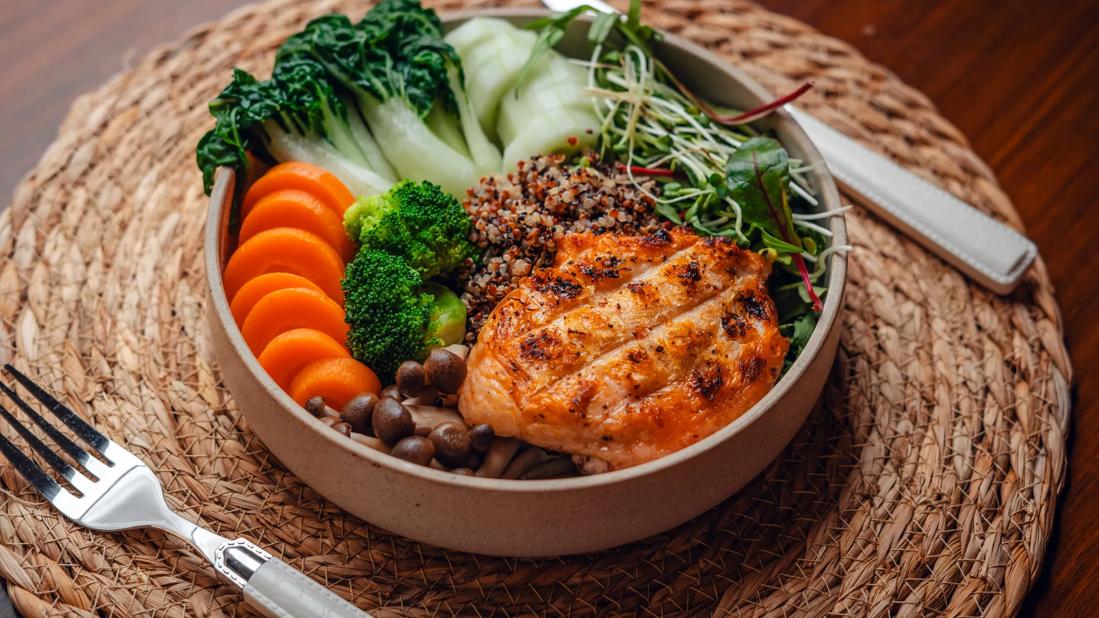Foods with iron, antioxidants and fiber can help you feel your best

Ever notice how when your period arrives, so, too, does the urge to curl up under a blanket, hugging a bag of potato chips or finishing off a pint of mint chocolate chip ice cream? (Or maybe both?)
Advertisement
Cleveland Clinic is a non-profit academic medical center. Advertising on our site helps support our mission. We do not endorse non-Cleveland Clinic products or services. Policy
Ever wonder if that’s really the best way to deal?
When you have your period, you might feel like mindless snacking on your favorite salty, sweet or ooey-gooey foods is the only way to muster through. But resisting the temptation can ultimately be much more satisfying, says Ob/Gyn Cristina McClure, DO.
The best foods to eat during your period are ones that are rich in iron, antioxidants and fiber.
“These healthy, natural foods will help keep your energy levels high, reabsorb extra estrogen and decrease inflammation,” Dr. McClure shares. “Really, they’re the best foods to eat any time of the month, but they can help you cope with period symptoms, too.”
Let’s take a look at some of the best period-friendly foods.
Iron helps your body create red blood cells. And replenishing blood lost during your period can help you stay healthy and keep you feeling your best.
“Iron-rich foods help restore your blood counts,” Dr. McClure reiterates.
Some of the best sources of iron include:
Animal products
Vegetarian proteins
Fortified foods
Advertisement
Fruits and veggies
Nuts and seeds
Antioxidants are an important part of any healthy diet, and getting your fill while you’re on your period can also help you feel your best.
Foods rich in antioxidants can help tamp down inflammation that can cause cramping, bloating and other period woes. What’s more, some kinds of antioxidants, like polyphenols, have been shown to improve mood.
Good sources of antioxidants include:
Fan-favorite dark chocolate also packs an antioxidant punch.
“Dark chocolate is a good source of flavonoids, which are a class of antioxidants,” Dr. McClure advises. “The darker the better, that way you get more of the cocoa solids — which is where the benefits stem from — and less of the sugar.”
Even still, keep your dark chocolate intake on the lower side. And save room for other healthy, period-helping foods.
When you have your period, it can help to eat foods that help rid your body of excess estrogen. Fiber is key to that.
“Some animal products and added oils contain estrogen. And they can cause your uterine lining to become abnormally thick. That can lead to more pain, including menstrual cramps,” Dr. McClure explains.
Eating fiber can help keep that from happening. Because fiber (among its many superpowers) helps you poop. And excess estrogen leaves your body in your poop.
Healthy, high-fiber foods include:
But easy does it when you’re upping your fiber intake, Dr. McClure warns. “If you’re not used to eating a high-fiber diet, you’ll want to make changes slowly. Too much fiber too fast can cause bloating and other stomach discomforts.”
Sipping on H2O is a healthy habit every day. But during your period, keeping hydrated is even more important.
Water a little boring for your taste? Jazz it up by adding some of your favorite fresh flavors to it, like lemon slices, berries, herbs or cucumbers.
And it’s not just downing a glass of water that can help keep you hydrated. Upping your intake of hydrating foods can help, too. Try:
When you have your period, you want to step away from processed foods, like ice cream, chips and cookies, even if they sound like they’re calling your name.
Advertisement
Here’s what to avoid and why:
Not all period-related discomforts can be managed with diet alone. If period aches, pains, fatigue or mood changes are interfering with your life, talk with a healthcare professional, like an Ob/Gyn or primary care provider.
Advertisement
Learn more about our editorial process.
Advertisement

Cravings are a natural response to hormonal changes, but giving into them may make you feel worse

These substitutes for tampons and pads can be a great option for lower cost, lower carbon footprint and longer wear times

Stress, PCOS, perimenopause or hyperthyroidism may cause a low flow

Pads are a low-effort option for period management and come in different absorbencies, materials and shapes

Fluctuating hormones, water retention and a change in habits can cause temporary weight gain

Stress can cause light, late or nonexistent periods — which may eventually create a hormonal imbalance

Your period typically gets darker as the days go on, starting out pink and changing to red, dark red and even brown

If you wash regularly and change your underwear as needed, this can be a safe (and liberating) alternative to pads and tampons

The tropical fruit is a good source of antioxidants and vitamin C

Most people fall asleep within 10 to 20 minutes, but if your experience is different, adjusting your sleep schedule may help

Exploring your hidden side can lead to better understanding of what makes you tick